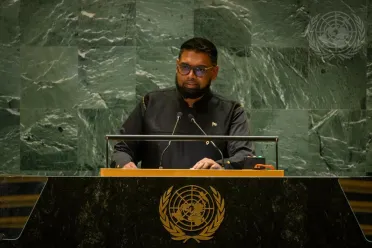Statement
Statement summary
MOHAMED IRFAAN ALI, President of Guyana, asked — if the States assembled “all agree” on ending war, reforming the Security Council, fixing the international financial system and achieving climate, food and energy security — “what is stopping us from acting?” He stressed: “We will all be doomed in the court of conscience for knowing what is right while ignoring what is wrong.” Noting that States make an “annual pilgrimage” to the United Nations Climate Change Conference — filled with hope, but where “unkept promises are the order of the day” — he underscored: “We must break free from this pattern of empty pledges.” For its part, Guyana — 86 per cent of which is covered in tropical forests — has the second-highest percentage of forest cover on the planet as well as one of the lowest rates of deforestation. Further, it straddles two of the richest biodiversity zones — the Guiana Shield and the Amazon — and is dedicated to the preservation of these vital global assets.
Spotlighting the Indigenous Peoples of Guyana as “the foremost stewards of this great natural heritage”, he reported that, in recognition of their leadership, 15 per cent of all revenues earned from carbon sales are directly transferred to his country’s Indigenous communities. “We have preserved our biodiversity and know its value,” he stated, emphasizing that “it is only fair and just that this global asset be monetized in a fair carbon market”. Today, announcing the launch of a “Global Biodiversity Alliance”, he said that its first summit — to be held in 2025 — will focus on creating a market for biodiversity credits, scaling biodiversity conservation debt swaps, accelerating biodiversity bonds, establishing a blueprint for biodiversity taxonomies and promoting nature-positive action. Additionally, Guyana commits to doubling its protected areas by December 2025 and achieving the global biodiversity target of conserving 30 per cent of the planet’s land and sea by 2030. These are “real solutions” to address the problem, he emphasized, adding that “we do not lecture; we lead by example, without arrogance”.
Turning to food insecurity, he urged “more concerted action” to address its root causes — reducing conflict, mitigating climate change and enhancing production and trade in food commodities. Guyana’s national agriculture policy will see at least 35 per cent of agribusinesses owned by women and 60 per cent by young people. Yet, “we find ourselves in a world where the quest for peace is met with the defiant echo of conflict”, he observed. While Ukraine’s sovereignty and territorial integrity are being violated, decisive Security Council action remains fettered by the veto. Elsewhere, the conflict in Sudan rages on, attended by the devastating consequences of famine and mass displacement, and women and girls in Afghanistan face continued oppression and persecution by the Taliban. “Closer to my home, CARICOM has been actively supporting a Haitian-led process” to restore democracy, peace and stability in that country, he noted. However, he underscored: “Peace, stability and safety are nowhere more imperilled than in Gaza.”
While condemning Hamas’ 7 October 2023 attacks, he stated that the “collective punishment” of an entire population “has long gone beyond the realm of self-defence”. Instead, the right to self-defence is being used as a weapon of mass extermination, stoking legitimate fears of genocide. No State should feel comfortable and safe when such atrocities are allowed to continue with impunity, and he stressed: “The war in Gaza must end now.” Additionally, he called for the revocation of the embargo on Cuba and recalled that the border between his country and Venezuela was “fully, finally and perfectly settled in an 1899 award by an international tribunal”. Noting the 2023 issuance of provisional measures by the International Court of Justice “in light of intensified acts of aggression by Venezuela”, he expressed hope that Caracas will accept the Court’s decision. Adding that the UN must fulfil its role as custodian of peace, promoter of sustainable development and protector of international law, he urged: “Let us not be found wanting.”
Speaking next from the group was Mohamed Irfaan Ali, President of Guyana, which despite being situated on the mainland, shares several of the vulnerabilities as small islands.
He said that among myriad challenges confronting the world, “climate change threatens our very existence,” as he underscored the need to follow through on commitments already made.
“Each year, we make the annual pilgrimage to COP, filled with hope for tangible outcomes,” he noted, referring the Conference of the Parties to the UN Framework Convention on Climate Change (UNFCCC).
“And each year we are regaled with renewed unkept promises. This cycle of hope followed by disappointment cannot continue if the Sustainable Development Goals (SDGs) are to be met,” he lamented.
“We must break free from this pattern of empty pledges. We must, unequivocally and immediately, fulfil all pledges for the sake of our planet and the future of all its inhabitants,” he underscored.
Full statement
Read the full statement, in PDF format.
Photo

Previous sessions
Access the statements from previous sessions.
